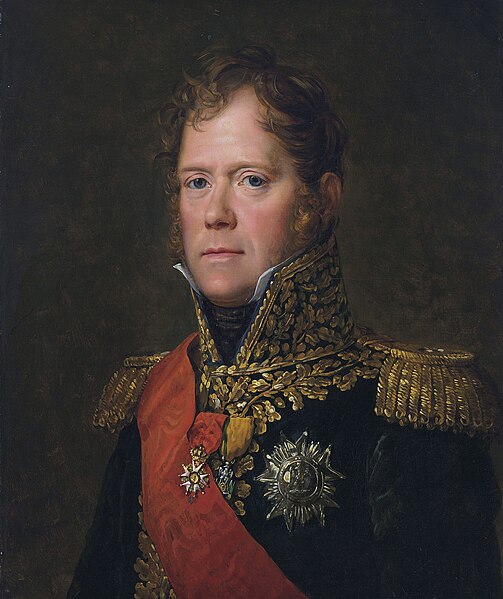The Battle of Quatre Bras was fought on 16 June 1815, as a preliminary engagement to the decisive Battle of Waterloo that occurred two days later. The battle took place near the strategic crossroads of Quatre Bras and was contested between elements of the Duke of Wellington's Anglo-allied army and the left wing of Napoleon Bonaparte's French Armée du Nord under Marshal Michel Ney. The battle was a tactical victory for Wellington, but because Ney prevented him going to the aid of Blucher's Prussians who were fighting a larger French army under the command of Napoleon Bonaparte at Ligny it was a strategic victory for the French.
The Prince of Orange at the Battle of Quatre-Bras, by Jan Willem Pieneman
Major-General Jean Victor de Constant Rebecque
The Prince Bernhard of Saxe-Weimar-Eisenach tells the officers of his brigade to stand their ground at Quatre-Bras
Brunswickers during the Battle of Quatre-Bras.
The Battle of Waterloo was fought on Sunday 18 June 1815, near Waterloo, marking the end of the Napoleonic Wars. A French army under the command of Napoleon was defeated by two armies of the Seventh Coalition. One of these was a British-led force with units from the United Kingdom, the Netherlands, Hanover, Brunswick, and Nassau, under the command of the Duke of Wellington. The other comprised three corps of the Prussian army under Field Marshal Blücher, a fourth corps of this army fought at the Battle of Wavre on the same day. The battle was known contemporarily as the Battle of Mont Saint-Jean in France or La Belle Alliance in Prussia.
The strategic situation in Western Europe in 1815: 250,000 Frenchmen faced about 850,000 allied soldiers on four fronts. In addition, Napoleon was forced to leave 20,000 men in Western France to reduce a royalist insurrection.
The resurgent Napoleon's strategy was to isolate the Anglo-allied and Prussian armies and annihilate each one separately.
Gebhard Leberecht von Blücher commanded the Prussian army, one of the Coalition armies that defeated Napoleon at the Battle of Leipzig
Marshal Michel Ney, who exercised tactical control of the greater part of the French forces for most of the battle








